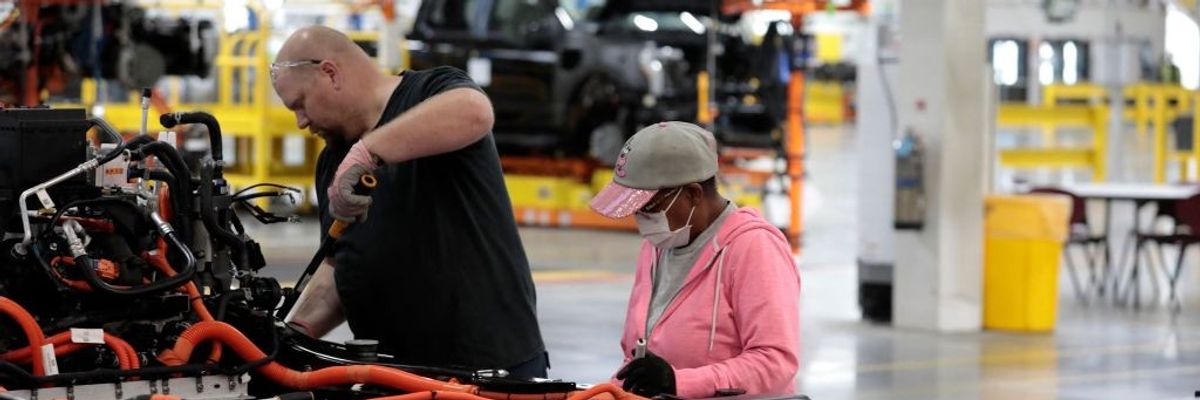After six weeks on strike, UAW leaders announced over the past week that they had reached tentative agreements with GM, Ford, and Stellantis. The deals with the automakers mark a new era in U.S. labor politics, including groundbreaking gains that help make the transition to electric vehicles more just.
Stellantis agreed to reopen a shuttered plant in Belvidere, Illinois, to produce both combustion vehicles and EVs, and include 1,000 new workers at an EV battery facility slated to open nearby in the union’s national contract. Ford and Stellantis granted the union the authority to strike to prevent plant closures. At Stellantis, workers can also strike to uphold company commitments to produce specific products.
Winning these demands marks a historic first, harkening to former UAW president Walter Reuther’s push for the union to play a role in guiding production decisions to meet social and environmental ends. Especially with new federal funding available to re-tool automaking facilities to make EVs, this sets a strong precedent for the union to call on companies to retain their current workforce as they transition to EVs, hopefully helping push back on right-wing efforts to scare workers into opposing the EV transition.
To prevent the worst catastrophes of climate change, we must push automakers to rapidly transition to fully electric fleets.
And though neither Stellantis nor Ford followed GM’s lead by agreeing to extend the contract to workers at its joint-venture EV battery facilities, Ford acceded to a card check neutrality process that would incorporate them if a majority sign up to join the union, along with transfer rights for workers laid off from other facilities. Together, these agreements grow the UAW’s stake in the clean auto industry of the future. Now is the time, then, for the union to align its words and actions, and truly welcome the EV transition.
Prevailing wisdom holds that EVs require less labor to produce, as they contain fewer parts than a traditional gasoline-powered vehicle. But with new research challenging that assumption, smart policy could even make the shift to EVs a job creator. Still, despite declaring support for the transition to electric fleets, fears of job loss recently drove the UAW's new firebrand President Shawn Fain to align with automakers and object to President Joe Biden’s proposed clean car standards.
Having voted for Fain as a member of the UAW’s growing ranks of academic workers and served as a strategic researcher for the UAW International, I was disappointed to read this news. I know I can never truly understand the concerns of autoworkers faced with the possibility that the EV transition could cost them their job. And I support every demand our union has made to make the transition as smooth as possible for all workers. But in 2017, when a series of record-breaking wildfires began to burn down the homes of my friends, neighbors, and co-workers, and raze entire communities in Northern California where I have lived most of my life, it became painfully clear to me that we are not moving fast enough toward a climate-safe economy.
What’s more, Fain’s position is not just contrary to my own; it also goes against our union’s record of mediating conflict between environmentalists and auto employers. In the 1970s, the UAW helped finance Earth Day, lobbied Congress to push automakers toward electric and fuel cell vehicles, and persuaded lawmakers to adopt a compromise air pollution standard for autos. More recently, the UAW helped hold back a loosening of fuel economy regulations, and motivated lawmakers I worked with to propose a tax credit for EVs produced using union labor. Our union can be an influential force for climate protections, but only if we embrace a just and rapid transition.
Toward those ends, Fain is right to call for public money supporting the EV transition to be tied to labor standards. Without them, the billions of dollars in subsidies EV makers are receiving could help undermine the middle-class jobs autoworkers fought for and deserve—just look at Tesla, with its growing list of violations of labor and safety laws; deaths at factories in Nevada, Texas, Shanghai, and California; and a culture of racist intimidation on the factory floor. These are the working conditions we must prevent from predominating in the green economy.
But he is wrong to argue that clean car standards that are not quite even aligned with climate science are “premature,” and should be revised to “increase stringency more gradually and occur over a greater period of time,” just as automakers are wrong when they say that the proposed guidelines are “neither reasonable nor achievable.”
To prevent the worst catastrophes of climate change, we must push automakers to rapidly transition to fully electric fleets. As they do, we must support the UAW to organize EV workers throughout the industry and build even more pathways to a just transition so that workers’ legitimate concerns about getting left behind do not clash with that goal. But we must also call on the UAW to use our influence to support clean car standards that reflect the urgency of the climate crisis. Our livable future depends on it.

